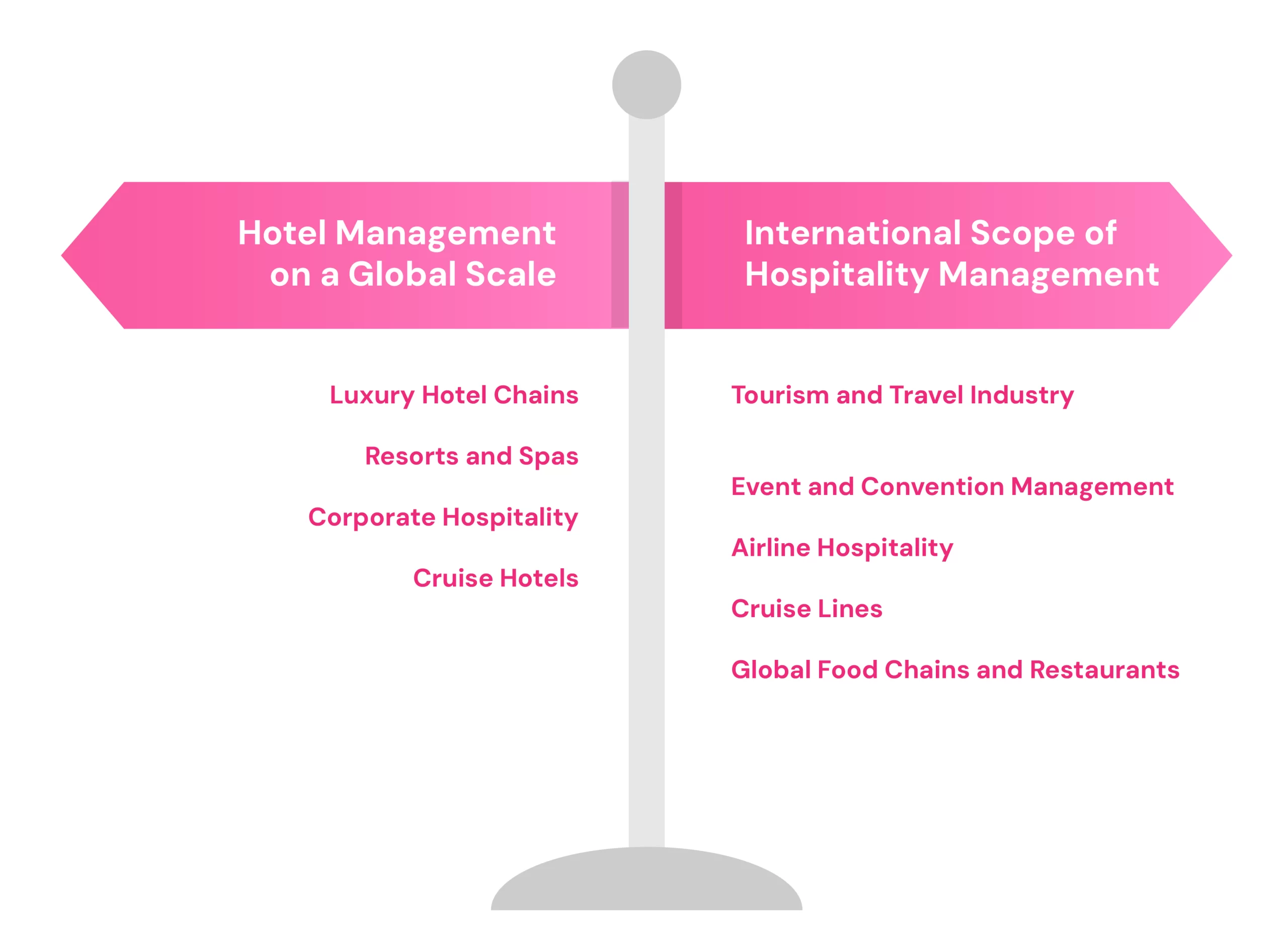How to Get Admission into World Class Universities
Hotel Management Vs Hospitality Management: Which Career Path Should You Choose?

The service industry is one of the sectors that is growing rapidly across the world, providing enormous career opportunities to ambitious professionals. Two of its most popular areas are Hotel Management and Hospitality Management, which are closely related but are completely different professions. Although both are based on the idea of providing outstanding guest experiences, they can be distinguished by their scope, responsibilities, and skill demands. Choosing the right path is a crucial decision that students and professionals must make to pursue a successful and fulfilling career.
In the contemporary globalised Business Environment, the boundaries between hotel management and hospitality management tend to blur, although knowing their subtleties can guide potential professionals towards sound decisions. There are no two ways about it: whether you aim to become a manager in a luxury resort or organisation, to organise an international event, or to lead a multinational hospitality corporation, you will choose between one or the other and that choice will define your career, skill set, and professional growth.
This is an all-encompassing guide that discusses the distinctions, career opportunities, competencies, and worldwide prospects in Hotel Management and Hospitality Management, so that you can make a well-informed choice about your future career in the service sector.
Knowing Hotel Management
Hotel Management involves the operation and management of hotels, resorts, motels, and other lodging facilities. It is aimed at providing quality services to guests and ensuring the smooth running of day-to-day operations.
Important Hotel Management Responsibilities
Hotel management professionals are expected to:
- Manage front desk and guest services.
- Supervise housekeeping and maintenance personnel.
- Oversee food and beverage services.
- Ensure compliance with safety and hygiene standards.
- Manage budgets, revenue, and profitability of the hotel.
- Adopt marketing measures to attract guests.
Hotel management focuses on efficiency in operations, customer satisfaction, and financial results. A hotel manager is responsible for ensuring that the hotel operates smoothly and that every guest leaves with a memorable experience.
Knowing Hospitality Management
The scope of Hospitality Management is broader, however. It covers hotels but also extends to industries such as tourism, event management, cruise lines, airlines, and resorts. It concentrates on the overall experience of guests, encompassing accommodation, travel, food, and entertainment.
Primary Hospitality Management Responsibilities
Professionals in hospitality management deal with:
- Managing customer experience across various service industries.
- Tourism, travel, and event management.
- Building and maintaining customer loyalty.
- Offering quality food, beverage, and accommodation services.
- Managing corporate hospitality and large-scale events.
Hospitality management refers to the process of offering holistic experiences that bring satisfaction to customers in hotels, restaurants, cruise ships, or tourist destinations.
Hotel Management Skills
In order to be effective in hotel management, professionals must have technical, managerial, and interpersonal skills. Key skills include:
- Leadership and Team Management: Hotel managers oversee different teams such as front office employees, housekeeping, and food and beverage staff. Strong leadership skills are essential for motivating staff, maintaining order, and fostering a spirit of cooperation.
- Customer Service Excellence: Delivering an outstanding guest experience is the foundation of the hotel industry. Professionals should be able to handle guest enquiries, complaints, and special requests with patience, empathy, and efficiency.
- Financial Management: Hotel managers must have a good understanding of budgeting, revenue management, and cost management. Profitability requires an understanding of financial statements, predicting revenue, and maximising resources.
- Operational Efficiency: From check-in processes to housekeeping schedules and restaurant operations, efficiency in daily operations promotes smooth running and high guest satisfaction.
- Problem-Solving and Decision-Making: Unexpected problems such as overbooking, maintenance issues, or staff shortages are common. Quick thinking and effective decision-making are required to resolve such situations without affecting the guest experience.
Hotel Management vs. Hospitality Management
One of the biggest decisions that students and professionals must make before joining the service industry is whether to pursue Hotel Management or Hospitality Management. Although both areas are concerned with guest satisfaction and service excellence, the range of responsibilities, career opportunities, and competencies differ significantly. It is a matter of personal interests, future aspirations, and the type of working conditions you wish to have.
1. Specialisation vs. Versatility of Interest
Hotel Management is the right choice if you want to focus on hotel operations, resorts, or lodging. It provides an organised path through which you will learn the ins and outs of operations such as front desk management, housekeeping, and food and beverage services.
Conversely, if you are excited by the prospect of working in a wide range of service-based businesses including travel, tourism, cruise lines, restaurants, or event planning. Hospitality Management Offers a broader scope. It equips you with a wider range of skills applicable in various fields.
2. Professional Objectives and Development Opportunities
This choice should be inspired by your long-term career aspirations.
If you aim to eventually become a General Manager of a hotel or resort, focusing on hotel management will provide the appropriate operational skills.
If you see yourself as a Global Hospitality Executive leading projects in the tourism sector, airlines, or event management, hospitality management will provide the broader foundation required.
3. Skill Set Alignment
Hotel Management relies heavily on operational and technical skills, including room management, catering services, housekeeping, and revenue optimisation. It requires attention to detail and problem-solving skills in day-to-day operations.
Hospitality Management, on the other hand, demands strategic, marketing, and leadership skills to enhance the guest experience across industries. It is particularly suited to people who enjoy handling customers, communicating, and engaging at a larger scale.
4. Global Opportunities
Both Hotel Management and Hospitality Management offer international careers, although their scope differs.
Hotel Management: Opportunities are primarily associated with luxury hotels, resorts, and boutique lodgings across the world. Careers in Hotel Management are especially prominent in countries such as Switzerland, Singapore, and the UAE.
Hospitality Management: Provides broader opportunities across cruise lines, airlines, event planning, and international tourism boards. This diversity often results in increased global exposure and career mobility.
5. Work Environment and Lifestyle
The work culture in each field is also worth considering.
Hotel managers often work long and irregular hours, particularly in front-office and operations. It can be challenging, but it also comes with the prestige of managing world-class properties.
Hospitality Management Roles can also be demanding, but they offer more diversity since the industry spans events, airlines, and tourism. These jobs often involve travel and interaction with diverse client groups.
6. Entrepreneurial Aspirations
A degree in Hotel Management may be particularly useful if you dream of opening your own restaurant, boutique hotel, or resort, given the depth of operational training it provides.
Hospitality Management, however, offers a broader perspective and inter-industry outlook, which can be advantageous if you aspire to establish a travel agency, event planning company, or hospitality consultancy.
Hotel and Hospitality Management Across the Globe

The international service sector is booming due to the growth of international tourism, luxury travel, business travel, and the rising demand for world-class customer experiences. Both Hotel Management and Hospitality Management offer exciting career opportunities on a global scale, though their scope varies in terms of industry coverage, geographical reach, and career advancement.
Hotel Management on a Global Scale
Hotel Management is universally recognised as a specialised career. With the expansion of luxury hotels, boutique properties, and international chains, skilled hotel managers are in demand worldwide.
- Luxury Hotel Chains: International hotel brands such as Marriott, Hilton, Hyatt, Accor, and Taj constantly seek professionals with hotel management expertise. Opportunities include positions as General Managers, Operations Managers, and Food & Beverage Directors.
- Resorts and Spas: Tourist destinations like the Maldives, Dubai, Bali, and Switzerland employ professionals to manage resorts, wellness centres, and spas.
- Corporate Hospitality: Business hotels catering to corporate clients in hubs such as Singapore, Hong Kong, London, and New York offer lucrative managerial roles.
- Cruise Hotels: Cruise liners function as floating hotels, requiring hotel management professionals to oversee lodging, dining, and housekeeping on board.
International Scope of Hospitality Management
Hospitality Management encompasses a wide range of industries, including tourism, travel, airlines, events, cruise lines, and restaurants, in addition to hotels. This breadth provides professionals with greater flexibility and mobility across global industries.
- Tourism and Travel Industry: International tourism in countries such as Spain, Italy, Thailand, and France creates demand for professionals in tourism boards, travel agencies, and cultural event planning.
- Event and Convention Management: Cities like Dubai, London, Las Vegas, and Singapore are global hubs for MICE (Meetings, Incentives, Conferences, and Exhibitions), requiring professionals to organise international conferences, concerts, and festivals.
- Airline Hospitality: Emirates, Singapore Airlines, and Qatar Airways are known for providing a luxurious in-flight experience, and in this case, hospitality managers are responsible for cabin crew training, customer experience, as well as high-quality services.
- Cruise Lines: Carnival, Royal Caribbean, and Norwegian Cruise Line companies provide opportunities to work in guest services, event planning, and entertainment management.
- Global Food Chains and Restaurants: Hospitality managers also have the chance to venture into global restaurant brands, franchise management, and culinary tourism.
Conclusion
The hospitality and hotel industry remains a broad field with endless career opportunities for anyone with an interest and curiosity in serving, leading, and managing others. Whereas Hotel Management is narrowed down to the specific operations of hotels, resorts, and lodging facilities, Hospitality Management encompasses a much wider range that extends to tourism, event planning, restaurants, airlines, and cruise lines.
If you are willing to pursue opportunities in Hotel Management or Hospitality Management overseas, websites such as MetaApply IE facilitate the endeavour. Whether it is university applications or advice on courses or destinations, MetaApply IE connects you to the best universities across the globe, helping you turn your dreams into reality.
Frequently Asked Questions
Hotel Management is specifically devoted to the activities of hotels and lodging companies, whereas Hospitality Management is broader and includes tourism, airlines, cruise lines, event planning, and restaurants.
Neither is inherently better, it depends on your career objectives. Hotel Management is best suited to people who want to work in the hotel and resort industry, while Hospitality Management is ideal for those seeking variety across the wider service sector.
Yes. As the world becomes increasingly mobile, both sectors provide excellent opportunities for international careers, particularly in Europe, North America, the Middle East, and the Asia-Pacific.


















































